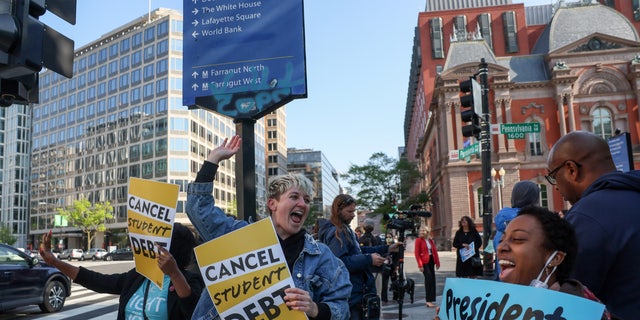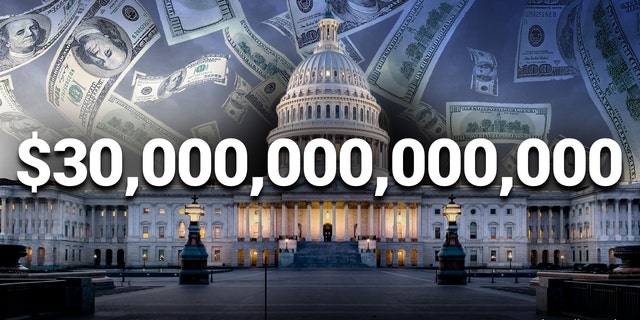White House silent on whether tax increases are necessary to pay for $300,000,000,000 student loan handout
The White House is silent on how President Biden’s decision to cancel between $10,000 to $20,000 in student debt for some Americans will be paid over the long run and whether it will drive tax bills higher even for average Americans.
Much of the discussion about the student debt handout has centered around its inflationary effects. But the gift will also have to be paid for, and that means taxpayers are likely on the hook for much of the principal and interest as the cost of the handout, estimated to be at least $300 billion and possibly as high as 600 billion, is dumped on top of the nearly $31 trillion in existing U.S. debt.
Fox News Digital asked the administration about a new analysis from the National Taxpayers Union Foundation estimating that the student loan handout will cost the average U.S. taxpayer more than $2,000. The fiscally conservative think tank, in particular, says the federal government will need to figure out a way in the future to make up for the forgiven loans, whether it be spending cuts or tax hikes. Much of it, the group predicts, will be via the latter.
The White House did not respond to questions about the report or if it was eyeing future tax hikes to make up for Biden’s student loan handout.
Administration officials, while not addressing how the added spending will be offset, have argued in recent days that the national deficit is already plunging under Biden’s watch.
“We actually achieved $350 billion in deficit reduction, and this year it’s projected, by the end of the fiscal year, to be a $1.7 trillion deficit reduction,” said White House press secretary Karine Jean-Pierre at the daily White House briefing.
BIDEN STUDENT LOAN HANDOUT COULD ELIMINATE SCHUMER-MANCHIN LAW DEFICIT REDUCTION
Administration officials have also claimed that the cost of Biden’s student loan handout cannot be fully accounted for since it’s unclear how many borrowers will opt to take advantage of the opportunity. They say that it remains unclear how many individuals would have paid back the full amount of their loans over time anyway.
“All of this as when it comes to costs will also depend on how many of the loans canceled were actually expected to be repaid,” said Jean-Pierre.
The National Taxpayers Union Foundation disagrees, however. The group issued an analysis earlier this week estimating that if the student loan handout adds nearly $330 billion to the deficit over the next decade, as a budget model by the University of Pennsylvania’s Wharton School of Business asserts, the average cost per taxpayer will be $2,085. But that could be on the low end. The Committee for a Responsible Budget puts the cost of the handouts at between $440 billion and $600 billion.
BIDEN’S STUDENT LOAN HANDOUT DIVIDES CONGRESS AS DEMS APPLAUD ANNOUNCEMENT, GOP ACCUSE OF VOTER ‘BRIBE’
When broken down, the data showed the sum to be significantly more for higher income brackets but still sock it to the middle class.
For instance, according to the group, taxpayers making between $1 and $50,000 annually would pay more than $158. The cost for those making between $50,000 and $75,000 is estimated to be $866, and $1,477 for individuals making $75,000 and $100,000, while those making between $100,000 and $200,000 would face costs upwards of $3,150. Earners pulling down $200,000 to $500,000 would pay nearly $9,950.
“Some may dispute that taxpayers bear the cost of canceling student debt. But the $329 billion cost of student debt cancellation would be $329 billion previously borrowed from the federal government and not returning to the Treasury,” the organization’s analysis states. “Policymakers will need to make up for that gap in the future with government spending cuts, tax increases, more borrowing, or some combination thereof.”

Biden announced Wednesday plans to forgive $10,000 in student debt for borrowers making less than $125,000 annually. Pell Grant recipients will receive $20,000 in debt handouts, provided their income is below the $125,000 threshold. Administration officials claim that no individual or household in the top 5% of earners will benefit from the decision.
The White House is also extending a pause on student loan payments through the end of the year. Coinciding with the announcement is a new Education Department proposal that allows borrowers to cap undergraduate loan repayment at 5% of their monthly income, adding to the cost to taxpayers of the handout.

“Using the authority Congress granted the Department of Education, we will forgive $10,000 in outstanding federal student loans,” Biden said in announcing the decision. “In addition, students who come from low-income families which allowed them to qualify to receive a Pell Grant will have their debt reduced $20,000.”
Susan Rice, the director of the White House Domestic Policy Council, has said that student loans obtained after June 30 of this year will be ineligible for the student loan handout.
Read the full article Here


